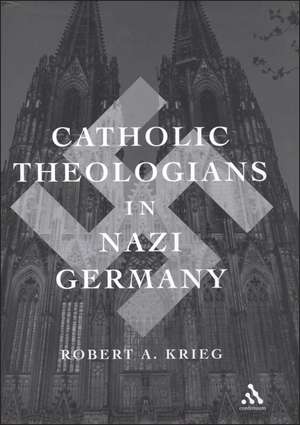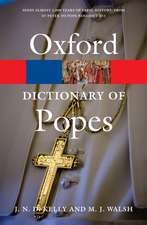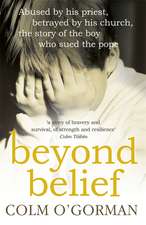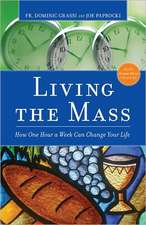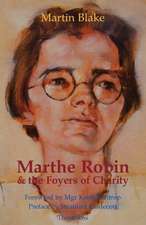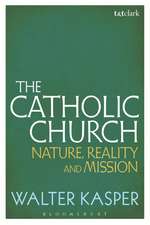Catholic Theologians in Nazi Germany
Autor Robert Kriegen Limba Engleză Hardback – 29 feb 2004
Preț: 377.35 lei
Preț vechi: 519.46 lei
-27% Nou
Puncte Express: 566
Preț estimativ în valută:
72.21€ • 74.49$ • 60.26£
72.21€ • 74.49$ • 60.26£
Carte tipărită la comandă
Livrare economică 27 martie-10 aprilie
Preluare comenzi: 021 569.72.76
Specificații
ISBN-13: 9780826415769
ISBN-10: 0826415768
Pagini: 244
Dimensiuni: 153 x 236 x 24 mm
Greutate: 0.52 kg
Ediția:New.
Editura: Bloomsbury Publishing
Colecția Continuum
Locul publicării:New York, United States
ISBN-10: 0826415768
Pagini: 244
Dimensiuni: 153 x 236 x 24 mm
Greutate: 0.52 kg
Ediția:New.
Editura: Bloomsbury Publishing
Colecția Continuum
Locul publicării:New York, United States
Recenzii
"Robert Krieg's work offers historians a very readable, understandable account of five major German Catholic theologians and their views on the mission of the Catholic Church in a modern world...By examining [their] teachings, Krieg demonstrates the conflicting and evolving notions of what the Church should be while he simultaneously impresses on the readers the idea that what these theologians believed had a substantial impact on the world as they were teaching their ideas to hundreds of seminarians each day...Krieg's excellent work underscores the idea that the Catholic Church's self-image had to be clarified after living through the darkness of the Hitlerzeit." - Beth A. Griech-Polelle, H-Net Reviews, April 2005
"Krieg's ability to combine close reading of texts...and his clear explanations of the intersection of philosophical, historical, and religious thought that resulted in the massacre of six million Jews, render his work imminently readable and informative...Krieg's work is particularly relevant today, when fundamentalist strains in all of the world's major religions are growing stronger and more violent." -Altar Magazine, 2004
"Among a spate of books published in recent years that deal with the checkered history of the relations between the Christian Church and the Third Reich, Robert Krieg's latest volume deserves special mention. Lauded by Cardinal Walter Kasper for his work on German theology and culture, Krieg has crafted another well-written and researched book that especially focuses on how five notable German Catholic scholars reacted to Hitler and the Nazi Program." - Peter Bernardi, S.J., Loyola University, Catholic Books Review, 2004
"This excellent book profiles five highly regarded German Catholic theologians whose careers were at their height during the Nazi era.... This book tells a fascinating story... Two main insights emerge from this book. One is that any kind of claim that either German Catholic leaders or the Vatican were enthusiastic about Nazism must be rejected." -JCS (Journal of Church and State), Autumn 2004
"Drawing on a wide variety of German and English sources, Krieg has written an informative book on an important and neglected topic. His evaluations of individuals are balanced and nuanced, with due attention to their historical context....makes an important contribution toward a better understanding of an important period of Catholic theology." -America, 12/13/04
"While written for an academic audience, I recommend this book to all who wish to understand the evolution of theology from its focus on protection of the institution to one that recognizes the church's mission to include the promotion of justice and human rights." -Catholic New Times, 1/30/05
This is a carefully researched and lucidly written explication of the difficulties that faced German bishops and leading theologians in their confrontation with National Socialism. Professor Krieg makes a seminal contribution to our understanding of how and why such influential Catholics could find theological justification for making accommodation with Hitler's regime. Yet he gives special place to those who resisted the Third Reich on religious grounds (Guardini and Krebs), and in doing so shows how they broke new ground in revealing the moral linkages between Catholic theology and the challenges of modernization. Krieg's book is required reading for those who seek not just a deeper understanding of German theologians and Nazism but how that experience contributed to the new theology that informed the Second Vatican Council. -- Jay P. Corrin, Professor and Chairman, Division of Social Science, College of General Studies, Boston University
"This volume is a most important addition to contemporary Catholic discussion on several counts.... In short, Krieg has given us a masterful study in history and ecclesiology. We owe him a great debt of thanks." -Catholic Library World, 75.3, 3/05
"Dr. Krieg's book is a well-written survey of the attitude of Catholic theologians toward Hitler." - National Catholic Reporter, October 7, 2005
"Krieg's ability to combine close reading of texts...and his clear explanations of the intersection of philosophical, historical, and religious thought that resulted in the massacre of six million Jews, render his work imminently readable and informative...Krieg's work is particularly relevant today, when fundamentalist strains in all of the world's major religions are growing stronger and more violent." -Altar Magazine, 2004
"Among a spate of books published in recent years that deal with the checkered history of the relations between the Christian Church and the Third Reich, Robert Krieg's latest volume deserves special mention. Lauded by Cardinal Walter Kasper for his work on German theology and culture, Krieg has crafted another well-written and researched book that especially focuses on how five notable German Catholic scholars reacted to Hitler and the Nazi Program." - Peter Bernardi, S.J., Loyola University, Catholic Books Review, 2004
"This excellent book profiles five highly regarded German Catholic theologians whose careers were at their height during the Nazi era.... This book tells a fascinating story... Two main insights emerge from this book. One is that any kind of claim that either German Catholic leaders or the Vatican were enthusiastic about Nazism must be rejected." -JCS (Journal of Church and State), Autumn 2004
"Drawing on a wide variety of German and English sources, Krieg has written an informative book on an important and neglected topic. His evaluations of individuals are balanced and nuanced, with due attention to their historical context....makes an important contribution toward a better understanding of an important period of Catholic theology." -America, 12/13/04
"While written for an academic audience, I recommend this book to all who wish to understand the evolution of theology from its focus on protection of the institution to one that recognizes the church's mission to include the promotion of justice and human rights." -Catholic New Times, 1/30/05
This is a carefully researched and lucidly written explication of the difficulties that faced German bishops and leading theologians in their confrontation with National Socialism. Professor Krieg makes a seminal contribution to our understanding of how and why such influential Catholics could find theological justification for making accommodation with Hitler's regime. Yet he gives special place to those who resisted the Third Reich on religious grounds (Guardini and Krebs), and in doing so shows how they broke new ground in revealing the moral linkages between Catholic theology and the challenges of modernization. Krieg's book is required reading for those who seek not just a deeper understanding of German theologians and Nazism but how that experience contributed to the new theology that informed the Second Vatican Council. -- Jay P. Corrin, Professor and Chairman, Division of Social Science, College of General Studies, Boston University
"This volume is a most important addition to contemporary Catholic discussion on several counts.... In short, Krieg has given us a masterful study in history and ecclesiology. We owe him a great debt of thanks." -Catholic Library World, 75.3, 3/05
"Dr. Krieg's book is a well-written survey of the attitude of Catholic theologians toward Hitler." - National Catholic Reporter, October 7, 2005
